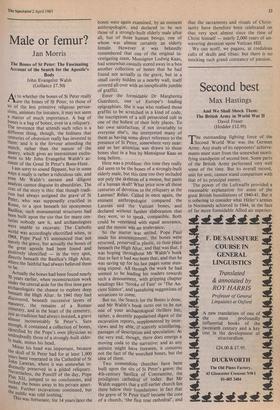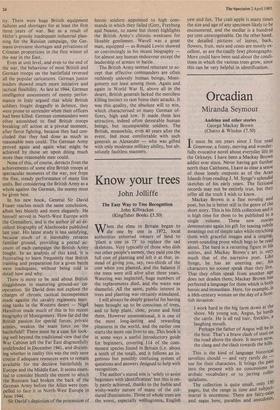Second best
Max Hastings
And We Shall Shock Them: The British Army in World War II David Fraser (Hodder £12.95)
rr he outstanding fighting force of the 1 Second World War was the German Army. Any study of its opponents' achieve- ments must start from the somewhat morti- fying standpoint of second best. Some parts of the British Army performed very well some of the time. But its overall record, unit for unit, cannot stand comparison with that of its principal enemy.
The power of the Luftwaffe provided a reasonable explanation for some of he great British humiliations of 1940-41. But it is sobering to consider what Hitler's armies in Normandy achieved in 1944, in the face of far more formidable Allied air superior- ity. There were huge British equipment failures and shortages for at least the first three years of war. But as a result of Hitler's grossly inadequate industrial plan- ning for the Russian campaign, the Ger- mans overcame shortages and privations of Crimean proportions in the first winter of the war in the East.
Even at unit level, and even to the end of the war, the behaviour of most British and German troops on the battlefield reversed all the popular caricatures. German junior leaders showed much more initiative and tactical flexibility. As late as 1944, German intelligence assessments of enemy perfor- mance in Italy argued that while British soldiers fought doggedly in defence, they were prone to surrender when their officers had been killed. German commanders were often astonished to find British troops breaking off action at a pivotal moment, after fierce fighting, because they had con- cluded that they had done as much as reasonable men could. The German Army proved again and again what might be achieved by those set upon doing much more than reasonable men could.
None of this, of courSe, detracts from the achievements of some elite British troops at spectacular moments of the war, nor from the fine, steady performance of many line units. But considering the British Army as a whole against the German, the enemy must be given best.
In his new book, General Sir David Fraser reaches much the same conclusion, albeit less bluntly and more elegantly. He himself served in North-West Europe with the Grenadiers, and is the author of an ex- cellent biography of Alanbrooke published last year. His latest study is less satisfying, because much of it inevitably retraces familiar ground, providing a potted ac- count of each campaign the British Army fought. In an analysis of this kind, it is frustrating to learn frequently that British training and preparation for a given battle were inadequate, without being told in detail how and why.
There is more to be said about British sluggishness in mastering ground-air co- operation. Sir David does not explore the charges of chronic tactical incompetence made against the cavalry regiments man- ning tanks in the Western desert — Nigel Hamilton made much of this in his recent biography of Montgomery. How far did the British passion for special forces, private armies, weaken the main force on the battlefield? There must be a case for look- ing well beyond the traditional view that the War Cabinet left the Far East disgracefully undefended in December 1941, and discuss- ing whether in reality this was the only sane course if adequate resources were to remain available for the decisive battlefields in Europe and the Middle East. It seems essen- tial to consider bluntly the extent to which the Russians had broken the back of the German Army before the Allies were com- pelled to face it in North-West Europe in June 1944.
Sir David's depiction of the procession of heroic soldiers appointed to high com- mands in which they failed (Gort, Freyburg arid Neame, to name but three) highlights the British Army's chronic weakness for likeable gentlemen. Wave11 was a great man, equipped — as Ronald Lewin showed so convincingly in his recent biography — for almost any human endeavour except the leadership of armies in battle.
The British Army seemed reluctant to ac- cept that effective commanders are often ruthlessly unlovely human beings, Mont- gomery not least among them. Again and again in World War II, above all in the desert, British generals lacked the merciless killing instinct to ram home their attacks. It was this quality, the absolute will to win, which characterised so many German of- ficers, high and low. It made them less attractive, indeed often detestable human beings, but incomparable soldiers. The British, meanwhile, even 40 years after the event, feel most comfortable with such generals as Alexander — who was gifted with only moderate military ability, but ab- solutely faultless manners.







































 Previous page
Previous page